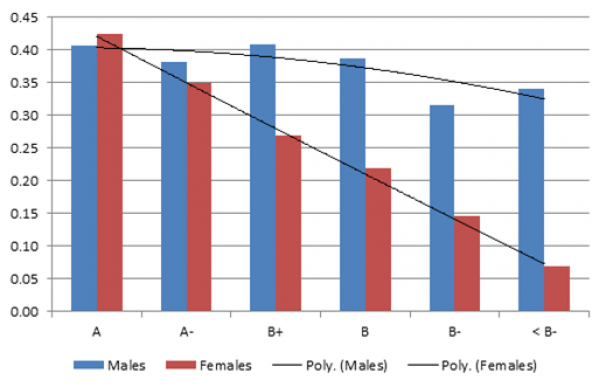The Washington Post gives us a fascinating glimpse into the choice of the economics major (is there anything about economics that’s not fascinating?).
Executive Summary: Women are more grade sensitive than men.
The data are from an “anonymous research institution” and the relationship of interest is the choice of the economics major based on the grade in the introductory economics class. For students getting As, for example, about 40% of males and between 40 and 45% of females go on to major in economics. For males, that’s pretty much true whatever grade they get, but females appear to be far more responsive to lower grades. The starkest comparison is for the A and the B+ students. Approximately 40% of male students who get an A or B+ become majors, whereas for females there appears to be about a 30% dropoff in the probability of becoming a major as the grade goes from an A to a B+. The interpretation is that women are more grade sensitive than men, and as a result move on to a different discipline, where presumably their grades are likely to be higher.
Here’s Harvard’s Claudia Goldin:
“Maybe women just don’t want to get things wrong,” Goldin hypothesized. “They don’t want to walk around being a B-minus student in something. They want to find something they can be an A student in. They want something where the professor will pat them on the back and say ‘You’re doing so well!’ ”
“Guys,” she added, “don’t seem to give two damns.”
I wonder what percentage of men and women go into an economics class with the idea that they are going to major in the subject? One possibility is that more men plan to go into economics, and are less discouraged by a “low” grade. Notice that overall, between 30 and 40% of men who take that class wind up as majors. We also know that men account for just over 70% of majors. So if we assume an equal split of men and women in going into an intro class of 100 people at the school where the data were collected, we might expect 17.5 men and 7.5 women to wind up as majors.
Incidentally, I looked at the past several years of data and 35% of our graduating seniors have been women, which is a solid 20% higher than the national average of 29%.
